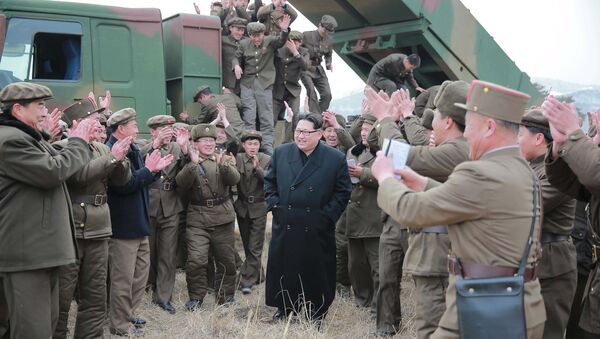WASHINGTON (Sputnik) — Kim's regime countered last week that the country has, in fact, miniaturized a nuclear warhead. If successful, the test would signify that North Korea has become an existential threat to the people of South Korea and, potentially, those living on the US mainland.
"I have speculated that the North Koreans have not been able to reliably construct an implosive lens that results in an extremely symmetrical sphere when the plutonium core is finally compressed," Postol said on Monday. "If this speculation is correct, it could explain the multiple tests of only a seven kilotons yield each."
Postol said his comments were based on the known difficulties that the original World War II US atomic bomb project faced, and the combination of extreme technical skill and industrial capacity that was needed to fabricate a reliable implosive lens.
"In the case of North Korea, they would certainly have the technical knowledge to know what they want to do, but it is entirely possible that their industrial capacity is not up to the job of fabricating a reliable implosive lens… it is definitely a possibility."
Postol, emeritus professor of science, technology and security policy at the Massachusetts Institute of Technology, noted that North Korea had carried out four underground nuclear tests in the past decade.
"The first of these tests appeared to be a fizzle — yielding about 100 tons rather than what one might guess would be about 20 kilotons. The following three tests all yielded about seven kilotons, considerably lower than the expected ‘nominal’ yield of about 20 kilotons or more."
Even a seven kiloton nuclear weapon would inflict close to the level of damage that was achieved at Hiroshima in 1945 with an atomic bomb that yielded 12.5 kilotons, Postol cautioned.
"The area directly destroyed would be roughly 70 percent as large as the area destroyed at Hiroshima (nearly four square miles). So the fact that the weapon is far from what the US first achieved would certainly not give comfort to anybody who was its target."
North Korean leader Kim Jong-un would certainly seek the largest and most impressive explosion possible from each of his nuclear tests, but so far he was not getting those results, Postol observed.
"The idea that a state that has a long record of aiming at the maximum terror possible would consciously choose to build such a low yield first-generation nuclear weapons is hard for me to entertain seriously."
It seems highly likely that the mores recent threats coming from Pyongyang are a continuing bluff by North Korea, Postol concluded.



